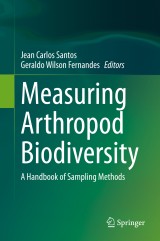Details

Measuring Arthropod Biodiversity
A Handbook of Sampling Methods|
181,89 € |
|
| Verlag: | Springer |
| Format: | |
| Veröffentl.: | 11.11.2020 |
| ISBN/EAN: | 9783030532260 |
| Sprache: | englisch |
Dieses eBook enthält ein Wasserzeichen.
Beschreibungen
<p>This book brings together a wide range of sampling methods for investigating different arthropod groups. Each chapter is organized to describe and evaluate the main sampling methods (field methods, materials and supplies, sampling protocols, effort needed, and limitations); in addition, some chapters describe the specimen preparation and conservation, species identification, data collection and management (treatment, statistical analysis, interpretation), and ecological/conservation implications of arthropod communities. The book aims to be a reference for zoologists, entomologists, arachnologists, ecologists, students, researchers, and for those interested in arthropod science and biodiversity. We hope the book will contribute to advance knowledge on field assessments and conservation strategies. Arthropods represent the most speciose group of organisms on Earth, with a remarkable number of species and interactions still to be described. These invertebrates are recognized for playing key ecological roles in terrestrial, freshwater and marine ecosystems. Because of the increasing and relentless threats arthropods are facing lately due to a multitude of human induced drivers, this book represents an important contribution to assess their biodiversity and role in ecosystem functioning and generation of ecosystem services worldwide.</p>
1. Fungal by-products in Food Technology.- 2. Sampling and Analysis Methods for Ant Diversity Assessment.- 3. Bees - How and Why to Sample Them.- 4. Social Wasp Sampling Methods.- 5. Sampling Methods for Butterflies (Lepidoptera).- 6. Sampling Methods for Beetles (Coleoptera).- 7. Arthropods: Why it is so Crucial to Know Their Biodiversity?.- 8. Sampling Methods of True Fruit Flies (Tephritidae).- 9. Sampling Methods for Dragonflies and Damselflies (Odonata).- 10. Sampling Methods for Termites (Insecta: Blattaria: Isoptera).- 11. Measuring Orthoptera Diversity.- 12. Hemiptera Sampling Methods.- 13. Collecting and Sampling Methods for Thrips.- 14. Techniques for Collection and Sampling of Pseudoscorpions (Arthropoda, Arachnida).- 15. Standardized Sampling Methods and Protocols for Harvestman and Spider Assemblages.- 16. Sampling Galls and Galling Arthropods.- 17. Collecting, Rearing and Preserving Leaf-Mining Insects .- 18. Canopy Insect Sampling.- 19. Sampling Methods for Soil and Litter Fauna.- 20. Sampling Methods for Aquatic Insects.- 21. Sampling Methods for Blood Feeding Insects Diversity.- Index.
<p><b>Jean Carlos Santos</b> – Bachelor on biological sciences (Universidade Federal de Uberlândia), master of sciences on ecology (Universidade Federal de Uberlândia) and doctorate on ecology (Universidade Federal de Minas Gerais). Santos is currently associate professor in the Department of Ecology of Universidade Federal de Sergipe, and previously, worked in the Biology Institute of Universidade Federal de Uberlândia. Has experience in ecology and entomology, acting on insect-plant interactions, gall-inducing insect and odonate diversity, and general ecology. More than 70 peer- reviewed articles published on various subjects and one book published with Springer. </p><p><b>G. Wilson Fernandes</b> – Bachelor on biological sciences (Universidade Federal de Minas Gerais), master of sciences and PhD on ecology (Northern Arizona University, USA). Has experience in evolutionary ecology, insect-plant interactions, biomonitoring, restoration ecology, climate change and environmental assessment. More than 500 peer-reviewed articles published on various subjects and five books published (two of them with Springer). Tinker visiting professor at Stanford University and visiting professor at the Universidad de Sevilla. Full member of the Brazilian Academy of Sciences and Research Fellow (1A) of the Brazilian National Research Council – CNPq. </p>
<p>This book brings together a wide range of sampling methods for investigating different arthropod groups. Each chapter is organized to describe and evaluate the main sampling methods (field methods, materials and supplies, sampling protocols, effort needed, and limitations); in addition, some chapters describe the specimen preparation and conservation, species identification, data collection and management (treatment, statistical analysis, interpretation), and ecological/conservation implications of arthropod communities. The book aims to be a reference for zoologists, entomologists, arachnologists, ecologists, students, researchers, and for those interested in arthropod science and biodiversity. We hope the book will contribute to advance knowledge on field assessments and conservation strategies. Arthropods represent the most speciose group of organisms on Earth, with a remarkable number of species and interactions still to be described. These invertebrates are recognized for playing key ecological roles in terrestrial, freshwater and marine ecosystems. Because of the increasing and relentless threats arthropods are facing lately due to a multitude of human induced drivers, this book represents an important contribution to assess their biodiversity and role in ecosystem functioning and generation of ecosystem services worldwide.</p>
Describes the main sampling methods for each arthropod group, including field methods, material and supplies, sampling protocols, effort needed and limitations Provides information on specimen preparation and conservation, species identification, data collections and data management, including statistical analysis and interpretation Aims to help entomologists, arachnologists, ecologists and zoologists choose the most appropriate survey methodology according the arthropod group thus contributing to advance knowledge on conservation strategies
Diese Produkte könnten Sie auch interessieren:

Auditory Signal Processing

von: Daniel Pressnitzer, Alain de Cheveigne, Stephen McAdams, Lionel Collet

213,99 €















